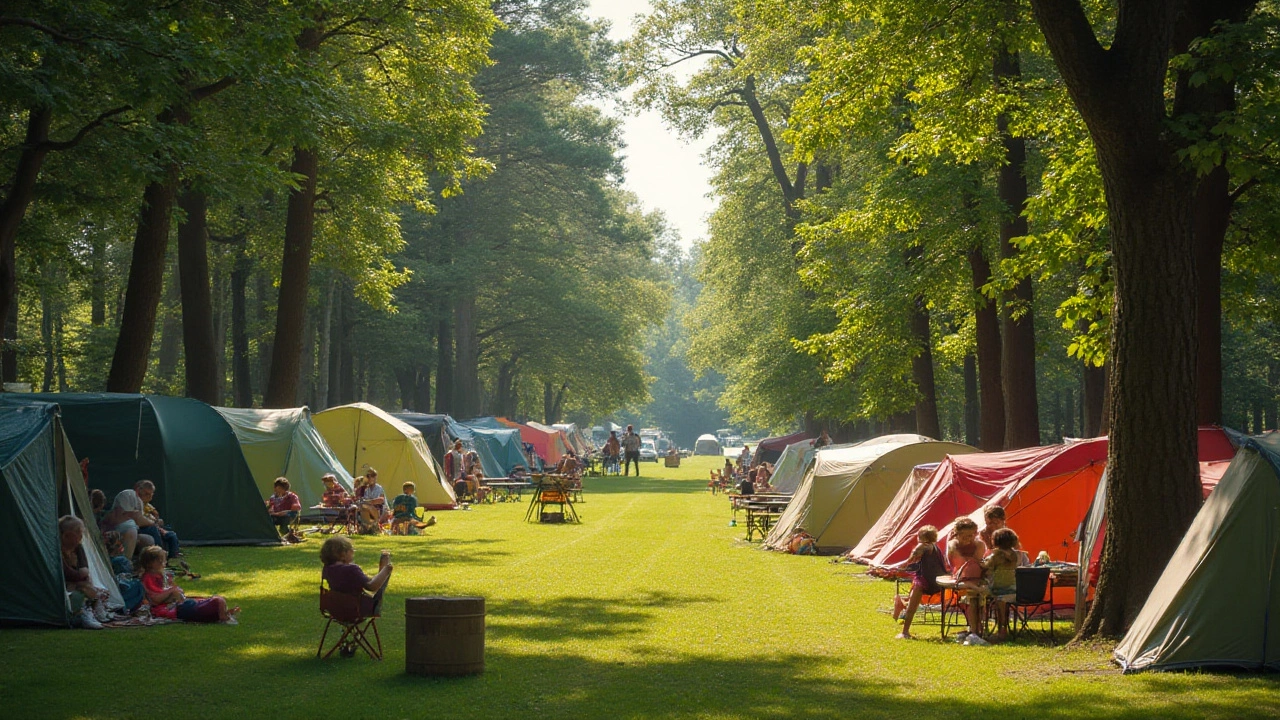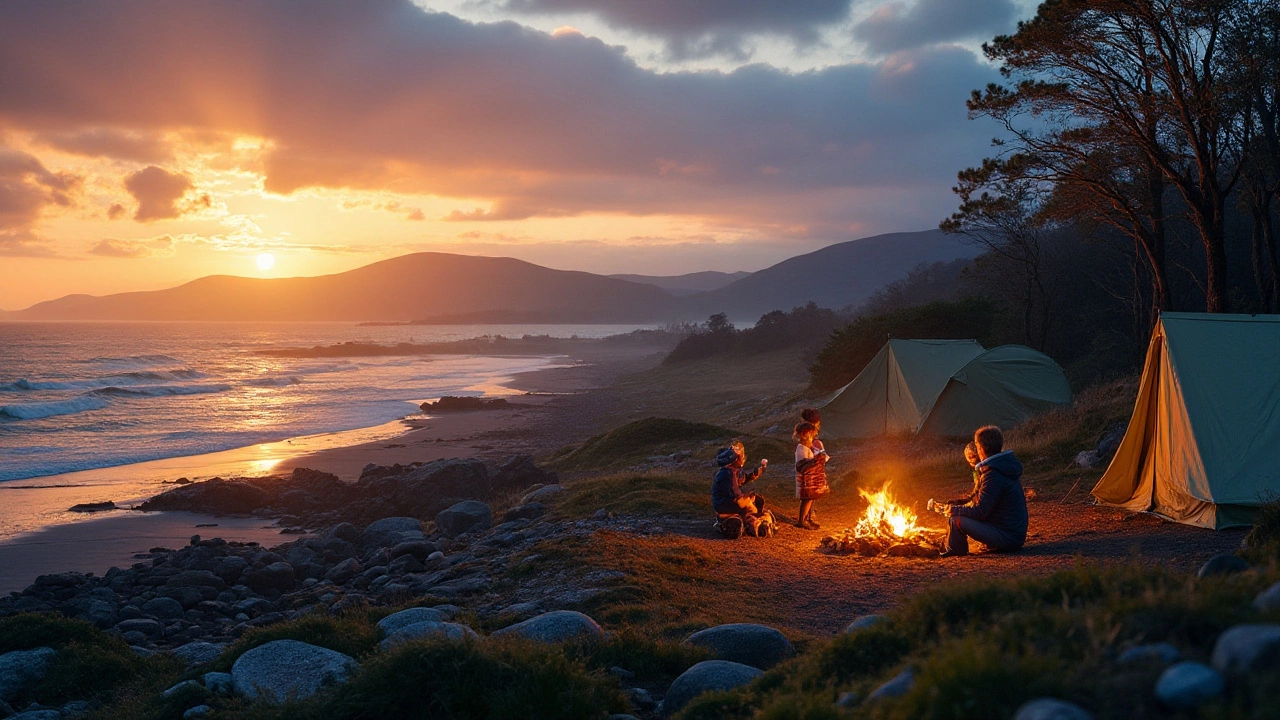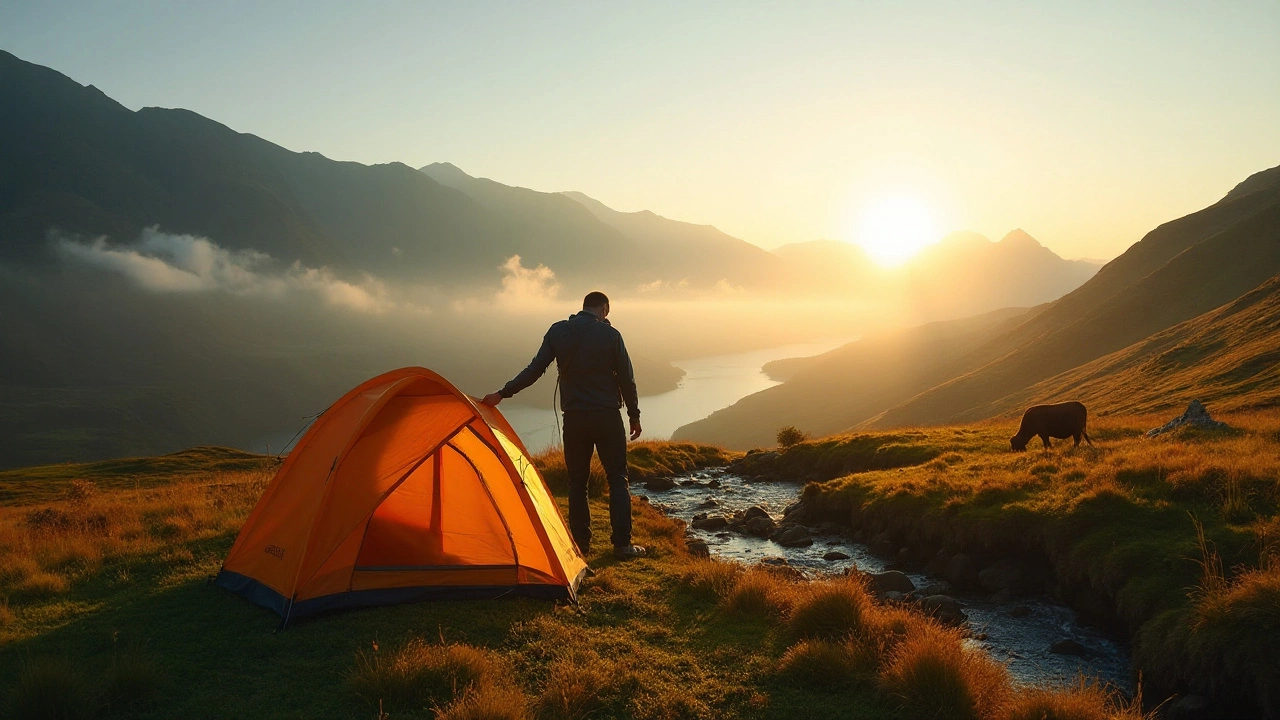If you're thinking about camping in the UK, it's key to know where you can legally set up your tent. With landscapes that whisper tales of old forests and rugged coastlines to explore, the temptation to camp freely is undeniable. Yet, the ability to do so depends on understanding region-specific laws and customs that govern wild camping.
In England, Wales, and Northern Ireland, the right to roam isn't as generous as in Scotland, where the rules are more relaxed. Most of the land in these countries is privately owned, meaning you'll need permission to camp. But fear not! There are still plenty of legal camping opportunities to be found if you know where to look and whom to ask.
Whether you prefer the structured amenities of a campsite or seek the solitude of a more remote location, respecting the land and local bylaws will ensure your outdoor adventure is both memorable and legal.
- Understanding Wild Camping Laws
- Legal Camping Spots in England
- Exploring Campsites in Scotland
- Wales and Northern Ireland Camping Rules
- Tips for a Responsible Camping Experience
Understanding Wild Camping Laws
When embarking on a camping trip, particularly if you're considering the adventurous route of wild camping, getting acquainted with the legal landscape in the UK is crucial. Different parts of the UK have distinct laws regarding where you can and cannot camp. Often, the freedom to pitch a tent wherever you please, known as wild camping, is romantically idealized but not legally permissible in many areas. In England and Wales, the land is largely privately owned, which means permission is required from landowners for you to camp. Public land that allows camping is rare unless you're discreet and leave no trace of your presence. By contrast, Scotland is more lenient due to the Land Reform Act 2003, which allows camping on unenclosed land. However, certain areas like Loch Lomond have their own bylaws due to overuse and environmental concerns.
A fascinating aspect of these regulations is the driving principle behind them: respecting the countryside. The rules against wild camping in many parts of the UK are in place to preserve natural beauty and prevent the landscape from being spoiled by litter or unsanitary conditions. Even with permissions, considered campers always follow the Leave No Trace principle. This includes taking all litter with you, being cautious with fires — if allowed — and ensuring that your presence does not disturb wildlife or crops.
"While many long to camp in the wild, it must be done responsibly and with permission," noted a spokesperson from the National Trust, emphasizing the importance of etiquette and unexplored beauty spots that can be found through abiding by local laws.
Consider too, the cultural impact of wild camping. For locals, unexpected tents can be intrusive, straying away from public paths can unintentionally disrupt farming activities or even become a safety concern in particularly rugged areas. To camp responsibly, you might consider reaching out to the local tourist board; they often have legal camping options even in seemingly secluded areas. Many walkers who take to the hills and mountains in search of solitude do so with respect and make use of bivvy bags or tarp setups instead of more invasive tent setups, which can signal transient camping and thus, limit intrusion.
Tips for Wild Camping
If wild camping is calling your name, here are some tips to ensure you comply with laws and make the most of your adventure:
- Seek Consent: Always ask landowners if they mind you camping on their land. A polite request goes a long way.
- Stay Inconspicuous: Choose a spot away from footpaths and keep tents low and natural in color.
- Leave No Trace: Take refuse with you, and leave the site as you found it.
| Region | Wild Camping Rules |
|---|---|
| England & Wales | Permission needed, mostly prohibited on private land |
| Scotland | Allowed under rights set out in the Land Reform Act, but be mindful of bylaws in specific areas |
| Northern Ireland | Very limited without permission |
Understanding these wild camping laws and adhering to them not only avoids personal trouble but protects the land for future generations. Always be aware of specific restrictions posted in areas where wild camping is typically allowed. With some research and a rather clever approach to permission-seeking, your experience can be just as magnificent as the scenery you're there to take in.
Legal Camping Spots in England
England boasts a patchwork of campsites nestled within some of the most stunning landscapes, from the rolling hills of the Cotswolds to the dramatic coastlines of Cornwall. For those planning a camping trip here, it's crucial to first comprehend the rules that protect these cherished lands. While wild camping in England typically requires the landowner's permission, there are abundant options for legally camping within designated sites. Managed by organizations like The Camping and Caravanning Club and The National Trust, these sites offer an excellent balance of nature and convenience.
Among the quintessential places in England to pitch your tent legally, the Lake District shines with its majestic lakes and towering peaks. Known for its association with poets and painters, this region offers numerous designated campsites that cater to a range of needs, from basic pitches to fully equipped sites. Each location promises breathtaking views and the serenity of the English outdoors. "The Lake District attracts those seeking both adventure and peace," wrote trail expert Sarah Baxter, eloquently capturing the allure of these lands.
Moving southeast, the South Downs National Park provides a contrasting landscape of chalk hills and vibrant villages. As England's newest national park, it offers well-maintained camping facilities that are easily accessible from major cities like London. Here, you can enjoy hiking trails, explore charming market towns, and indulge in the tranquil beauty of rural England. The park embraces campers by offering both traditional campsite amenities and back-to-basics options, which means there's something for everyone.
If historical intrigue interests you, then heading towards Hadrian's Wall Country in Northumberland could provide an extraordinary camping experience. This spot is not only rich in Roman history but also offers an impressive selection of campsites that emphasize historical exploration and natural beauty. From there, enthusiasts can venture forth to explore the surrounding areas that are steeped in stories from a time when the Roman Empire extended into Britannia.
For those who crave a wilder experience without stepping over legal boundaries, Dartmoor National Park is worth considering. Though widely known for rugged and unspoiled lands, recent pilot projects have granted limited permissions for wild camping. These are designed to encourage respect for the land while giving campers a taste of true wilderness.
- Be aware of local regulations, which can change seasonally.
- Seek out sites by trusted organizations with eco-friendly practices.
- Respect no-camping zones to preserve England’s natural beauty.

Exploring Campsites in Scotland
Scotland is a true haven for camping enthusiasts, offering a unique blend of rugged landscapes and open access laws that make it one of the most accommodating places for wild camping in the UK. The Land Reform (Scotland) Act 2003 grants everyone the right to camp on unenclosed land, a freedom cherished by those seeking adventure amidst its stunning scenery. This means you can set up camp in the Highlands, near glens and lochs, as long as you adhere to the Scottish Outdoor Access Code. Yet, with great freedom comes great responsibility, as campers are encouraged to leave no trace, ensuring that the environment remains pristine for future explorers.
One of the most notable features in Scotland's camping experience is its vast network of campsites that cater to varied preferences. From basic pitches in remote locations to more equipped sites with facilities, there's something for every type of camper. Many campers often favor sites within National Parks like the Cairngorms or Loch Lomond and The Trossachs, places that boast breathtaking landscapes and a myriad of activities. Those looking to be close to popular hiking trails or renowned fishing spots will find themselves pleasantly accommodated by these campgrounds.
An interesting statistic to note is that as of the latest data, Scotland hosts over 500 official campsites, each offering a distinct flavor of natural beauty and cultural heritage. From tiny village sites among the Hebrides to expansive grounds in the heart of the Highlands, options abound for both seasoned and novice campers. Several sites also provide pre-pitched tents or cabins dubbed as ‘glamping’ spots for those who want a dash of comfort while immersing themselves in nature.
Another delightful aspect of camping in Scotland is the opportunity to witness its rich wildlife. Many campsites are strategically situated close to nature reserves or ecosystems teeming with life, providing campers with opportunities to see indigenous animals like the majestic red deer, golden eagles soaring overhead, or even bottlenose dolphins along coastal sites. The diversity of flora and fauna adds an enriching layer to the camping experience, connecting campers not just with the landscape but also with its living inhabitants.
If you're considering a trip to Scotland's more remote areas, remember to plan your journey with consideration of weather conditions. The climate can be unpredictable, even in the summer months, and being prepared with the right gear is crucial. Scottish weather is known for its swift changes; hence waterproof and windproof clothing is essential, alongside reliable camping equipment. Investing in a high-quality camping stove can be a boon, as the ability to cook warm meals adds greatly to the comfort of wild camping.
Finally, it's noteworthy that while the spirit of adventure thrives in Scotland, campers are often encouraged to support the local economy. Purchasing supplies from local shops or participating in community activities fosters goodwill and respects the communities that preserve and maintain these beautiful places. As the Scottish proverb goes, "A stranger's a friend you have yet to meet," and this welcoming spirit will surely enhance your camping journey among Scotland’s cherished landscapes. Engaging with locals can uncover hidden gems and stories that no guidebook could ever reveal.
Wales and Northern Ireland Camping Rules
Camping in Wales and Northern Ireland presents unique challenges and opportunities for outdoor enthusiasts. Much like England, the land in these regions is predominantly privately owned, requiring campers to obtain landowner permission prior to setting up camp. Known for its breathtaking landscapes, Wales offers a blend of rolling hills, lush valleys, and serene coastlines, making it an appealing camping destination. However, navigating the legalities of wild camping in such areas can be complex. It's not illegal, but the lack of a legal right means negotiation is key. This often involves planning ahead, engaging with local farmers, and potentially agreeing to certain conditions such as leave-no-trace principles.
Northern Ireland, with its dramatic terrains and rich tapestry of folklore, follows a similar legal framework. The land here is predominantly owned by individuals or private estates, and thus camping without permission is considered trespassing. The National Trust, which oversees significant areas of land, generally prohibits wild camping unless explicitly stated. Some outdoor enthusiasts find success by reaching out to local authorities or utilizing designated camping areas that provide scenic and legal alternatives.
Obtaining Permission
Securing permission to camp on private land in both regions is a process that requires diplomacy and understanding. Respectful communication with landowners can lead to access, and many are quite accommodating if campers express a willingness to uphold environmental responsibilities. This is echoed by Peter Adelstein, a seasoned hiker, who noted,
"Building a rapport with landowners not only gains access but enriches the camping experience with local insights that you wouldn't get otherwise."This method encourages sustainable camping practices and helps build a community-focused approach to outdoor recreation.
Finding Alternatives
For those who prefer structured campsites, both regions offer a variety of alternatives. Accredited campsites often provide amenities ranging from basic facilities to comprehensive glamping options, catering to different preferences and comfort levels. Wales, in particular, is home to numerous campsites near iconic Welsh national parks, such as Snowdonia and the Brecon Beacons, where organized camping is encouraged and comes with the advantage of established hiking trails and nearby attractions.
| Region | Legal Requirement |
|---|---|
| Wales | Landowner's Permission Required |
| Northern Ireland | Landowner's Permission Required |
It's essential for campers to respect nature and the local communities in these regions, embracing the principle of 'Leave No Trace.’ Not only does this practice ensure the land remains unspoiled for future visitors and wildlife, but it also demonstrates respect for the hospitable relationships between landowners and campers, fostering a culture of mutual respect and understanding.

Tips for a Responsible Camping Experience
Camping in the UK can be an exhilarating adventure, encompassing vast and varied landscapes. To ensure your outdoor escapade leaves no negative impact, responsible practices should be at the heart of your journey. Understanding simple principles of sustainable camping can preserve the beauty of nature for fellow adventurers and future generations alike. Being mindful about where you camp is crucial. Always seek the landowner's permission when camping on private land, which is common practice in England, Wales, and Northern Ireland. Unlike its more lenient counterpart, Scotland, where 'freedom to roam' rules give certain liberties, other regions require specific clearances. Equipped with this knowledge, you can lay the groundwork for a harmonious camping trip.
Natural areas should be left as you found them—or ideally, in better condition. This isn't just a rule; it's a philosophy that seasoned campers uphold. When you camp, make sure every piece of trash or leftover is packed away. Littering not only tarnishes natural beauty but also harms wildlife. Animals may be drawn to human waste, leading to dangerous situations for them and for people. Do not assume that feeding wildlife is a kind gesture, as it disrupts their natural habits and dietary needs. For human waste, it's wise to dig a small pit at least six inches deep and cover it properly after use, ensuring it’s situated away from water sources. A responsible camper understands they are visitors in these ecosystems and strives to leave minimal trace behind.
Fires add a comforting charm to the camping experience, yet recklessness can have dire consequences. Before lighting a fire, ensure it’s safe and permissible in your chosen spot. Some areas prohibit open fires due to the environmental risk. If fires are allowed, keep them small and contained, always using fire rings or designated areas. Never leave a fire unattended, and always extinguish it properly before leaving. Pour water over the embers and stir until no heat or smoke is visible. For cooking, consider using a gas camping stove, which poses less risk and is generally allowed in more areas than open fires. Remember, a diligent guard over fire safety can prevent calamities.
Engagement with fellow campers and locals can enrich your camping experience. Embrace the camping community by participating in shared activities or simply exchanging friendly greetings. If camping in an area close to locals, respect privacy by maintaining a respectable distance. Sources like the Ramblers Association often encourage such acts of responsibility, noting,
One of the key pleasures of hiking and camping is the incredible connections you make along the way—both with nature and fellow explorers.It’s also courteous to support local businesses, whether by purchasing supplies or recommending fellow adventurers try a local delicacy or service. These acts foster goodwill and ensure a warm welcome should you choose to return.
Incorporating Leave No Trace principles into your camping routine enhances the responsibility you exhibit towards nature. These guidelines consist of: planning ahead to minimize impact, camping on durable surfaces to avoid soil erosion, disposing of waste responsibly, respecting wildlife and avoiding feeding or disturbing them, and being considerate of other visitors in natural areas. By following these guidelines, you ensure that your journey through the UK’s remarkable camping spots remains a positive one, both for yourself and others who come after. Together with an understanding of legal camping practices, these habits contribute to a culture of care and conservation.
- Seek landowner's permission when necessary
- Pack out all your trash
- Adhere to fire safety rules
- Engage with fellow campers
- Follow Leave No Trace principles
